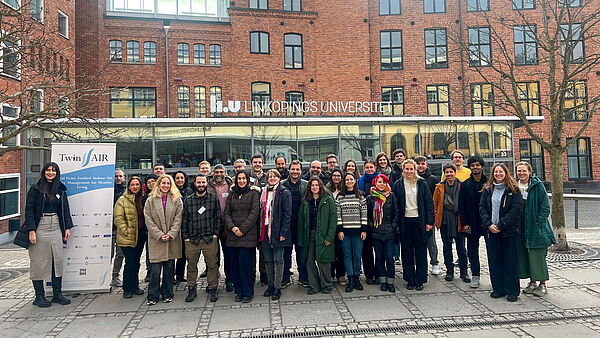On 25 and 26 February, the second General Assembly of the TwinAIR project took place at Linköping University in Sweden. The meeting provided a platform for an intensive exchange between the project partners and served to evaluate the progress made so far and to plan further project steps and milestones.
Participants met at the Linköping and Norrköping campuses of Linköping University to evaluate the progress of the project and plan the next steps. In plenary sessions, the work package leaders presented the latest developments, followed by lively discussions on technical and organisational challenges. Participants also had the opportunity to visit the TwinAIR sensor installation sites on the campuses and see the technology in action.
TwinAIR - digital solutions for better indoor air
The quality of indoor air has a direct impact on human health. Pollutants can lead to respiratory diseases, allergies and other health problems. To counteract this, the TwinAIR project is developing digital solutions that are based on real-time data and make a targeted contribution to improving indoor air quality.
At the centre of the project are digital twins - virtual images of buildings that record and analyse sensor data on air flows and pollutants. With the help of this technology, ventilation and heating systems are to be controlled more intelligently in order to minimise pollution and thus optimise air quality.
The role of inIT in the TwinAIR project
The EU project, coordinated by the University of Petras in Greece, brings together 23 partners from nine European countries. At inIT, the project is based in the Technologies of Digital Transformation working group led by Prof. Dr. Lukasz Wisniewski. Within the project, the working group is responsible for data management and is developing a platform that integrates a wide variety of data sources and makes them usable for applications, while its expertise in sensor technology and data analysis is making an important contribution to the realisation of the project objectives.
Prof. Dr. Lukasz Wisniewski, Deputy Director of inIT, emphasises the importance of cooperation within the project: ‘The General Assembly has once again shown how valuable the exchange between the international partners is. It is only through shared expertise and close cooperation that we can develop forward-looking solutions for better indoor air quality.’


